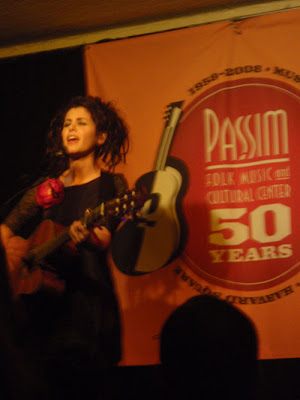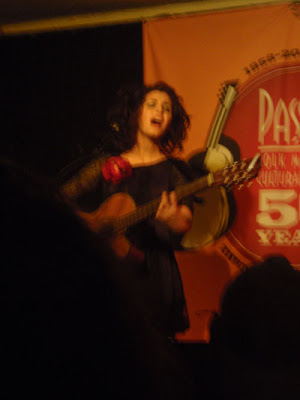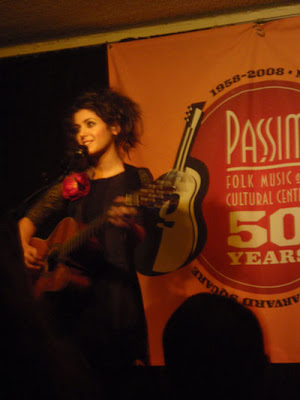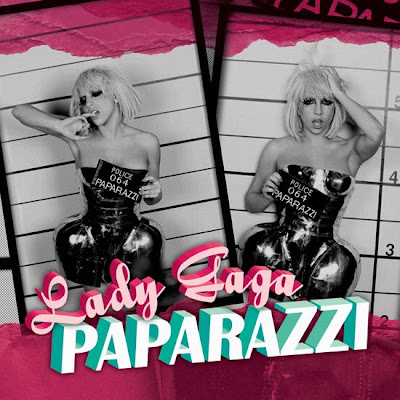| Hildegurls – Electric Ordo Virtutum (Innova) Posted: 30 May 2009 04:23 AM PDT 
Contemporary interest in the work of Hildegard Von Bingen (1098-1179) has been considerable and there are a number of faithful renditions of her considerable surviving compositions generally available. Whether the interest is a result of feminist scholarship or a late 20th Century resurgence in mysticism is moot. This 2009 release is a recording of a 1998 New York production by the Hildegurls; a group comprising of Lisa Bielawa, Eve Belgarian, Kitty Brazelton, Elaine Kaplinsky and directed by Grethe Barrett Holby.
The clear distinction with this production is the utilisation of electronic manipulation: in the Prologue the use of an electronic drone consisting of prolonged samples of a refrain. Multitracking of vocals to create chorus, use of a harmoniser to create a vocal counterpoint effect and digital sound processing to reproduce organum effects. Sampling is heavily utalised especially in the sections pertaining to dialogue delivered by the devil which is effectively constructed as a profoundly disturbing and confusing sound event. In act 2 tape is used to create vocal harmonies of 12 singular virtues with the live chorus of virtues and in act 3 different aspects of the soul are represented in acoustic samples of instruments. Besides all the allegorical use of sound devices to construct this morality play, Elaine Kaplinsky plays keyboards, Kitty Brazelton electric guitar and various percussion instruments are utalised. Composition of this work into a vibrant and complex event, which conveys the essential ecstatic struggle and eventual triumph of the soul with satan, rests with Grethe Barrett Holby. Having founded American Opera Projects and been a prominent in modern opera in America for over 25 years, she is also a choreographer, director, performer and adaptor of operatic works. It is an intricate an innovative approach to the work of Hildegard Von Bingen, when many approaches have tended towards replication, Electric Ordo Virtutum explores with a specifically technological approach and radically reworks the form while remaining true to the essential characteristics of the works portent. Innerversitysound |
| Between Interval – The Edge Of A Fairytale (Spotted Peccary) Posted: 30 May 2009 04:23 AM PDT 
Swedish ambient producer Stefan Strand first started experimenting with electronic sounds in his teens, initially inspired by video game soundtracks and the likes of Jarre and Pink Floyd, before going on to self-release his debut album as Between Interval ‘Radio Silence’ in 2003. Since then, he’s released two subsequent albums through California-based label Spotted Peccary, and this fourth album ‘The Edge Of A Fairytale’ represents his first new material since 2006’s ‘Autumn Continent.’ In this case, this latest collection takes its title from Strand’s overriding conceptual theme of life existing "on the edge of a fairytale – between the known and unknown", something that’s reflected in mythologically fixated track titles like ‘Minotaur’s Lair’, ‘Atlantis Lost’ and ‘Eden In Shadows.’ Opening track ‘Delta Capricorni’ offers a pretty good indication as to to the sorts of deep ambient atmospheres to be found amongst the eleven tracks here, opening proceedings with sorts of vast synth pads, harmonic sweeps and deep, ominous bass drones you’d associate with Tangerine Dream or ‘Baraka’s Michael Stearns – indeed, it’s practically begging to be accompanied with some time-lapse video footage of desert clouds. ‘The Great Void’ sees some darker, more ominous tones edging into proceedings as whirring textures creep in alongside mournful, minor key washes of synths, but in many senses Strand never really allows the darkness to completely take over here, preferring instead to focus on a mood that’s more awed than really menacing – something that’s nicely reflected in the creeping bass synth pulse and cosmic-sounding synth washes of ‘Minotaur’s Lair.’ All things considered, ‘The Edge Of A Fairytale’ is beautifully produced stuff that while it perhaps doesn’t really offer any new, unexpected angles on the ambient genre certainly shows Strand successfully conjuring immersive atmospheres over its one hour running length. That said however, the adherence to the same sorts of elements means that there’s often little to distinguish individual tracks here, and a slight sense of repetition creeps in here at points. |






 As promised
As promised





